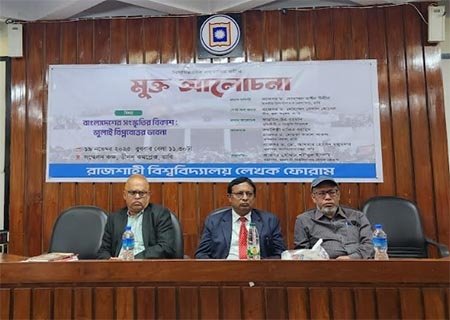RU holds open discussion on ‘Evolution of Bangladeshi Culture: Reflections After the July Uprising’
Published: 10:53 PM, 19 November 2025 Last Update: 10:56 PM, 19 November 2025
RU holds open discussion on ‘Evolution of Bangladeshi Culture: Reflections After the July Uprising’

Al Mahmud Bijoy ,RU Correspondent: Rajshahi University yesterday hosted an open discussion titled “Evolution of Bangladeshi Culture: Reflections After the July Uprising organised by the university’s writter Forum. The event took place at 11:30am at the conference room of the Deans’ Complex.
Speaking at the discussion, Prof Dr Akhtar Hossain Majumdar, administrator of RU’s Public Relations Office, said the biggest challenge for post-July Bangladesh is to create a truly inclusive cultural space. “Years of political repression fostered a defensive cultural practice,” he said. “July has given us a new opening. Our culture is not limited to music and performance—it is much broader. We now need new language, new narratives and new social dialogues. The revolution will be fulfilled only when art, literature, music and the media can freely express people’s realities, aspirations and struggles.”
Former dean of the Faculty of Science, Prof Dr Abul Hashem, said the July uprising opened “a new horizon of cultural consciousness”. “For long, fear, self-censorship and a ‘don’t-speak’ culture overwhelmed society,” he said. “That has been broken by a new generation of free thinkers. Our task now is to organise this wave of creative freedom and turn it into a stable, institutional foundation. July is not mine alone—it is ours. If we can build a cultural bridge from villages to cities, this revolution will go beyond a mere change of power.”
Addressing the event as chief guest, RU Pro-Vice Chancellor (Administration) Prof Dr Mohammad Main Uddin said that to make any revolution sustainable, political change alone is not enough. “It requires rebuilding social trust, igniting cultural awakening and embedding democratic values into everyday life,” he noted. “A revolution endures when education, arts, media and civil society together create an inclusive environment where people feel safe to express themselves. When people’s language, experience and culture remain at the centre of nation-building, change leaves a lasting imprint on social character and state policy.”
The discussion was presided over by Prof Muhammad Shariful Islam. Cultural analyst Fahmid-Ur-Rahman attended as the keynote speaker, while Prof Dr Belal Hossain, dean of the Faculty of Arts, was present as guest of honour.
Also speaking at the event were writer Nazib Wadud, Prof Dr Mostafa Kamal Akand, and RUCSU treasurer Prof Dr Setaur Rahman. Teachers, students and residential hall provosts were also in attendance.



